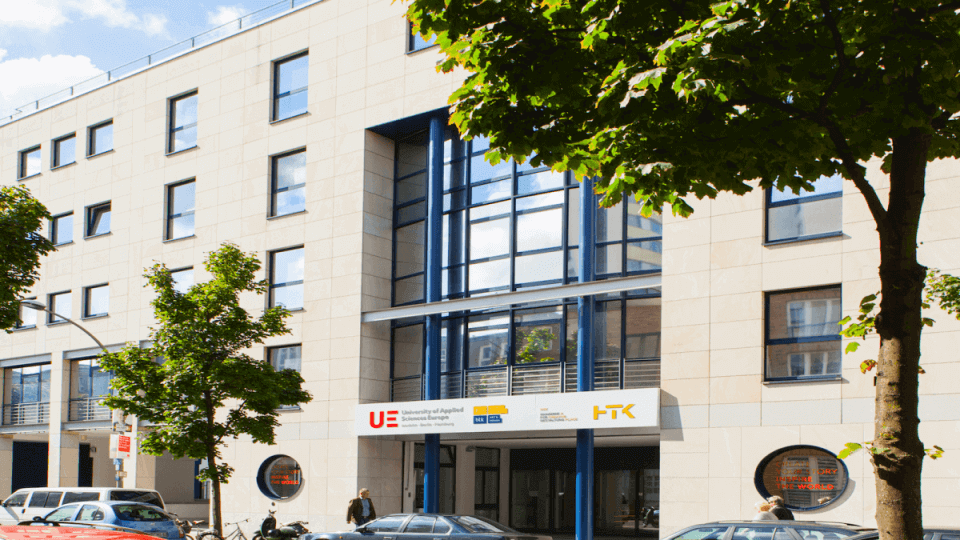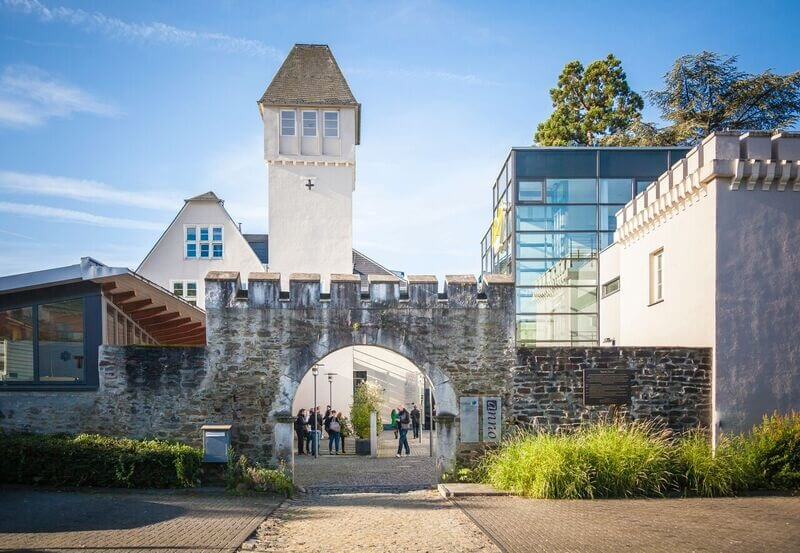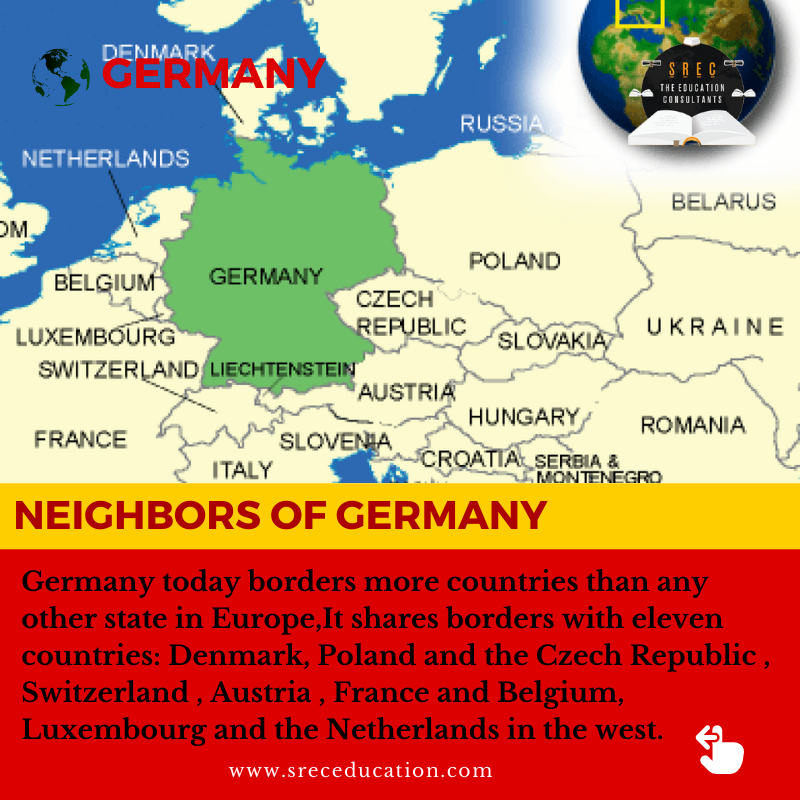
Germany is one of the oldest popular study abroad destinations. It is known for the Science and Engineering courses but then again, it has so much more to offer the students. With tuition fees that are lower than most of the other overseas education locations and a system dedicated to helping students grow and learn better, Germany is the ideal destination if you are planning to be part of an education system that is very highly regarded across the globe.
Quality of life in Germany is one of the highest in the world, according to the latest UN Human Development Index (HDI). Only Norway, Switzerland and Ireland perform better.
Germany has a temperate climate throughout the country with warm summers and cold winters, however, long periods of frost or snow are rare. Rain falls throughout the year. Extremes temperatures sometimes reach -10° C (5°F) in winter and 35° C (95° F) in summer months.
ABOUT GERMANY
Germany, officially the Federal Republic of Germany is a country in Central Europe. The country is the second-most populous country in Europe after Russia. It has 16 constituent states. It shares borders Denmark, Poland, Austria, Switzerland, France, and the Netherlands.
Germany is the ninth most visited country in the world as of 2017, with 37.4 million visits. Berlin has become the third most visited city destination in Europe.
QUICK FACTS
- CAPITAL: BERLIN
- RELIGION: CHRISTIANITY
- POPULATION: 83 MILLION
- CURRENCY: EURO
- LANGUAGE: GERMAN
- DIALING CODE: +49
- SUMMER TEMP: 24°C
- WINTER TEMP: -2°C
Business & Finance
Maths & Science
Computer
Hospitality
Engineering
Accounting
Business & Finance
Maths & Science
Computer
Hospitality
Engineering
Accounting
Top Universities in Germany

Berlin School of Business and Innovation (BSBI)
Berlin School of Business and Innovation (BSBI) is a business school founded in 2018 & run by the Netherlands-based for-profit education company Global University Systems (GUS). As per the evolution made by Edurank, BSBI Social Media ranked 3rd in the world among Business Schools.

UNIVERSITY OF APPLIED SCIENCES EUROPE
The European University of Applied Sciences prepares specialists from various fields: business, psychology, media and communication, sports management, and art. The university emerged as a result of the merger of two educational institutions: BTK University of Art & Design and the BiTS University of Business Leadership.

IU International University of Applied Sciences
The European University of Applied Sciences prepares specialists from various fields: business, psychology, media and communication, sports management, and art. The university emerged as a result of the merger of two educational institutions: BTK University of Art & Design and the BiTS University of Business Leadership.

SRH Hochschule Berlin
SRH Berlin University of Applied Sciences is a state-accredited private university in Berlin that is part of SRH Holding. The university of applied sciences was founded in 2002. The introduction of English-speaking academic programs at Bachelor’s and Master’s level began in 2006

Admission Procedure
The admission process can be broadly divided into the following steps:
- The desired course & university needs to be decided on the requisite English proficiency tests like IELTS/ PTE/ TOEFL.
- Entry Requirements are to be followed
- Certificates of Class 10 & 12, Graduation (if Applicable), PG as well as grades of English proficiency test are to be kept ready
- Applications to be sent to Colleges/Universities
- After sending the applications, candidates can expect to receive either a conditional offer/ unconditional offer/ rejection.
- The Unconditional Offer letter needs to be accepted by Payment of preliminary deposits as required by the particular university/ institution
Requirements & Procedures
List of Documents Required
- Passport
- Academic Transcripts
- Statement of Purpose (SOP)
- Proof of English Test taken – IELTS/TOEFL/PTE
- Work Experience Certificate
- Letter of Recommendation
- Curriculum vitae
Visa Guidance
- Arrangement of Funds from Acceptable Resources, such as savings account, PPF, Fixed deposits, or Education Loan.
- Bank Statements are to be provided
- Confirmation of COE
- Medical Examination to be Undergone
- SOP to be Written for visa and Preparation to be taken for visa Interview
- Online Visa form To be filled
- fees to be filled and application Form to be Submitted.
What is English Proficiency Test?
Students can appear in any of the following tests.
- International English Language Testing System (IELTS)
- Test of English as a Foreign Language (TOEFL)
- Person Test of English (PTE) Academic
Our Main Service
Admission and Guidance
QUICK FACTS
- Undergraduate Bachelor Degree – Rs. 8, 00,000 p.a. onwards
- Postgraduate Masters Degree – Rs. 12, 00,000 p.a. onwards
Students can work part-time 20 hrs during their studies and 40 hrs full-time during vacations. You may earn good enough to support your living expenses or may save some money as well.
After completion of your program, you can stay back in Germany for 18 months on a post-study visa. During this period you can search for full-time employment.
What this Country offers
German universities have global higher education standards. Students value these universities for the quality of education, hands-on experiences during their studies, opportunities to improve academically during and after studies and most importantly the safe and friendly environment.

POPULAR COURSES AMONG INTERNATIONAL STUDENTS:
- Engineering
- Management
- Computer Science and
- IT Creative Arts,
- Humanities and
- Arts Social Sciences
Universities in Germany
There are over 380 officially recognized universities throughout Germany, and they offer a total of over 17,000 study programs.
German? The language of instruction at most universities in Germany is German. All students undertaking a German-taught program will need to be able to demonstrate a firm knowledge of the language, either by means of a language test result or by taking a preparatory course.

Check out the FAQ’s to know the Answers to the Frequently Asked Questions
Germany FAQ
There are numerous International Degree Courses taught in English for international students who do not have sufficient knowledge of the German language to enroll in a course entirely in German. You may find programs in English if you go through the International Study Programmes in Germany and search for options in English.
Germany is home to some of the best universities in the world and students love this country due to its affordability, cultural diversity, as well as employability. Some of the universities in Germany are ranked among the top worldwide universities in the major ranking lists ensuring that the education system in the country is top-notch. You will graduate with just the right skills to enter the global labour market with confidence.
You will be able to find any course of your interest in German universities since there is a wide range of options available. You will get to grow academically as well as develop your personal skills. Apart from the academic benefits, you will also get to know what an authentic German experience is like by visiting museums and old castles, attending festivals, climbing a mountain or swimming in a lake.
As all German universities offer a very qualitative education, it is hard to rank a university. However, when choosing an institution, you should take several aspects into account as the size of the university, the range of subjects, the location as well as the cost of living in that city.
Non-EU/EEA students are able to work in Germany alongside their studies, for 120 full days or 240 half days per year.
On completion of their studies, students from non-EU countries who wish to stay back and take up full-time gainful employment may extend their residence permit for up to 18 months to find work relating to their area of study.







